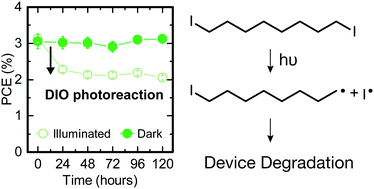Photoinduced degradation from trace 1,8-diiodooctane in organic photovoltaics†
Abstract
1,8-Diiodooctane (DIO) is a high boiling point solvent additive commonly used to control the active layer morphology of bulk-heterojunction organic photovoltaic (OPV) films. OPV devices fabricated using DIO often show improved efficiency, but recent studies have suggested that light exposure may cause residual DIO to react with OPV materials. We use NMR to quantify the amount of residual DIO in bulk heterojunction (BHJ) layers, finding that after a typical thermal evaporator high vacuum cycle DIO is still easily observed. This suggests that most completed devices contain trapped DIO. While OPV devices processed without DIO remain stable, devices processed with DIO rapidly degrade under illumination, even if they had undergone sequential heating and vacuum steps to remove the DIO impurity. These results suggest that impurities that can act as radical initiators, such as DIO, can be detrimental even at concentrations as low as 20 ppm by mass.

- This article is part of the themed collection: 2018 Journal of Materials Chemistry C HOT Papers


 Please wait while we load your content...
Please wait while we load your content...